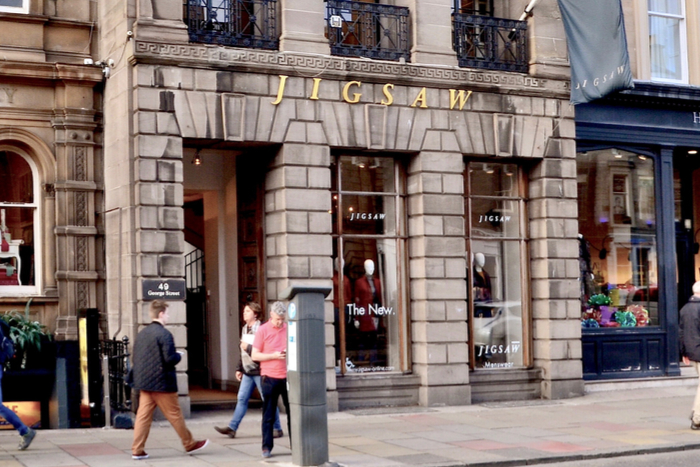A BRIEF TIMELINE
1970: John Robinson founded Jigsaw in 1970. The first store opened in Brighton, England.
1972: Jigsaw opened its second store in Hampstead, London.
1989: Jigsaw won the British Fashion Council Award for Contemporary Design of the Year.
1994: Jigsaw launched its menswear range.
1996: Jigsaw Junior was launched, initially consisting only of girls clothing. Jigsaw opened a store on London’s Bond Street as well as stores in Japan and Denmark.

1997: Robinson stepped in as co-chief executive along with chairman Charles Atterton.
1998: Jigsaw’s menswear range was bringing in an annual turnover of £15 million.
1999: Jigsaw’s menswear designer Chris Bailey bought out Jigsaw Menswear and rebranded it Uth – pronounced “youth” – offering more eccentric designs at higher prices.
2001: Jigsaw launched its first accessories brand.
2002: Uth closed down.
2004: Jigsaw opened its first US store in Los Angeles.
2005: Jigsaw opened concept store The Shop at Bluebird on London’s King’s Road, which offered edited designer fashion, homeware and vintage finds.
2006: Catherine Middleton, the then-girlfriend of Prince William, is employed as an assistant accessories buyer.
2007: Middleton left the company after working four days a week. Jigsaw pulled out of the Irish market after trading on Grafton Street in Dublin.
2010: Jigsaw hired Kate Holt as group director of ecommerce.
2011: Parent company Robinson Webster Holdings posted a pre-tax loss of £21.2 million.
2012: Jigsaw relaunched its menswear brand under the direction of Frances Walker.
2013: Jigsaw appointed former John Lewis executive and buying director Peter Ruis as chief executive.
2014: Jigsaw launched its flagship store Duke St Emporium in London’s Mayfair. It brought together Jigsaw and The Shop at Bluebird under the same roof for the first time.

2015: Jigsaw launched a pricing manifesto pledging not to discount in season, but instead to offer end of season sales.
That same year, Jigsaw handed £493,000 to workers in a profit-sharing deal. Employees of at least one year’s standing were given at least one share in the company, and on Christmas Eve, they received a dividend of £400 per share.
Jigsaw announced it would return to Ireland with a new retail outlet in the Grafton Building on South Anne Street in Dublin.
In December, Jigsaw reported that its yearly sales surpassed £100 million for the first time At the time, Jigsaw said it expected to see a stock market listing within the next three years. The retailer also appointed James Williams as head of online trading and digital marketing.
2016: Jigsaw recorded a 19 per cent increase in sales over the 2015 Christmas period.
Talks with City advisers and investment banks about a sale took place. Husband and wife owners John and Belle Robinson reportedly considered the sale of a majority or minority stake, or a stock market float.
Jigsaw also revealed ambitious expansion plans to add at least 65 stores to its store estate over the next five years.
2017: Jigsaw’s head of online trading and digital marketing, James Williams, stepped down to join Phase Eight for a similar role. In March, Holt was promoted to the position of omnichannel director.
Sale talks emerge yet again in 2017. In October, Robinson appointed KPMG to explore options for its future, including the sale of a majority or minority stake. In November, Jigsaw held talks with Hobbs’ parent company Foschini, aiming to strike a fast-track takeover deal.
That same month, Jigsaw launched its immigration campaign to hail the necessity of immigration amid Brexit negotiations.
Fab new advertising campaign from U.K. retailer Jigsaw. #heartimmigration .Brave, clever and different. pic.twitter.com/3JWEtrsBwK
— Michael Murphy (@Michaelmurphypr) October 10, 2017
January 2018: Jigsaw reported a seven per cent sales rise for the five weeks to December 31, despite not taking part in Black Friday promotions.
February 2018: Jigsaw’s chief operating officer Richard Gilmore stepped down to become Fred Perry’s new managing director.
March 2018: Ruis stepped down as chief executive to join Anthropologie as international managing director. Atterton returned in an executive role. In the same month, Jigsaw secured a £20 million deal in a bid to protect itself from collapse. Robinson said he would inject £5 million into the business. The retailer also sought to offload a stake to entrepreneur and Carphone Warehouse founder David Ross.
August 2018: Jigsaw appointed former Pentland Brands global president Chris Stephenson as chief executive. Meanwhile, Robinson Webster Holdings said Jigsaw’s year to September 30, 2017 saw a pre-tax loss of £783,000 – falling dramatically from a £2.7 million profit a year prior.
November 2018: Jigsaw announced it would launch its first ever Black Friday sale, breaking its 2015 pledge. This saw selected items offered at 20 per cent off.

January 2019: Stephenson stepped down after six months as chief executive, moving to a non-executive position. Group HR director Toby Foreman replaced Stephenson as interim chief executive. Atterton also announced his retirement after more than 20 years at Jigsaw in various roles.
March 2019: Jigsaw board member Claire Wain stepped down to join Jack Wills as chief financial officer.
June 2019: Jigsaw appointed former Landsec head of finance Despina Don-Wauchope as finance director.
July 2019: Holt resigned from her role after serving Jigsaw for nine years.
January 2020: Jigsaw announced that The Shop at Bluebird would close for good. During the same month, Jigsaw sought a 30 per cent rent reduction from its landlords and asked to delay rent payments in a bid to avoid a high street demise. The retailer appointed Colliers International to advise on its property portfolio. Later that month, Jigsaw hired former Karen Millen chief executive Beth Butterwick to work on a project on an interim basis, but would not reveal the details of what this entailed.
July 2020: Jigsaw called in KPMG advisers as well as Cavendish Corporate Finance to put together a strategic review that could potentially lead to a sale of the business or closure of a raft of stores. Jigsaw said at the time it could permanently close an unspecified number of its 75-strong store estate. The coronavirus pandemic and subsequent lockdown had exacerbated its financial challenges.
August 2020: Jigsaw said it was preparing to launch a CVA. It earmarked 19 of its stores that could face closure after launching the CVA proposal.
September 2020: Creditors green light Jigsaw’s CVA. Jigsaw confirmed it would shut some stores and switch to turnover-linked rent. At least 200 jobs will be made redundant from 13 store closures, which includes outlets in Westfield London, Bluewater in Kent, Manchester and Birmingham.
THE REASONS
Prior to its CVA, Jigsaw had 74 stores and employed 900 people across the UK. The fashion retailer witnessed declining sales even before the Covid-19 crisis – partly due to a slower adoption of technology compared to competitors and topped off by a lack of cash. In short, the coronavirus pandemic is not entirely to blame for Jigsaw’s woes.
The retailer had started closing down some of its underperforming stores in 2019, and there has been a major changes in its executive leadership team over the last year or so. Its parent company Robinson Webster Holdings also reported two consecutive declines, so the CVA does not come as a complete surprise.
The CVA entails 41 Jigsaw stores switching to turnover-based rent, while the remaining 16 shops will remain on full rent. Of the 41 switching to turnover-based rent, 24 will pay the higher of 11 per cent of net sales turnover each year or 20 per cent of its contractual rent. The remaining 17 stores will pay eight per cent of net sales or 10 per cent of the contractual rent.
A Jigsaw spokesperson told Retail Gazette that the company decided to launch a CVA to make sure it was “best placed to navigate the current challenging retail environment”.
“Company performance has been poor over the last four years,” they said.
“Whilst other retailers have focused on investing in their digital capabilities, the business continued to invest in additional store locations resulting in a lease portfolio viewed as expensive by market standards.
“Jigsaw will need to cut out any waste in the supply chain and maintain a single focus on a return to financial health”
“The whole of the retail sector has seen a move to the convenience of online shopping and the outbreak of Covid-19 has only accelerated this trend.
“Customers of all ages are shifting to the convenience of shopping this way which will continue to challenge the rationale for stores in certain locations and trading volumes in stores generally.
“The CVA forms part of a wider strategic review of the overall business. Over the last 18 months, Jigsaw has sought to simplify its operations by refocusing on the company’s core business of providing high quality women’s fashion and accessories in the UK.
“A cost base review is underway to reflect this.”
Patrick Elliot, corporate recovery and insolvency specialist at Keystone Law, said Jigsaw needed to consider closing the most loss-making stores in a bid to revitalise the business.
“It will need to invest in technology, stabilise management and get customers through the door,” he said.
“Like most retailers, it has suffered from changes to the way consumers shop; it needs to improve the shopping experience it offers so as to attract more customers.”
Jigsaw faces the same challenges as most fashion retailers, and is yet another case of a retailer struggling to create a successful online offering. This is coupled with a decline in high street sales, along with a dramatic decrease in footfall and a rapid shift to online shopping thanks to the lockdown and the months since reopening.
Simon Geale, senior vice president for client solutions at Proxima, said that in order for Jigsaw to survive, it needed to “cut out any waste in the supply chain and maintain a single focus on a return to financial health”.
“Jigsaw has a strong brand and rich heritage, which is a big plus, and any business that has demand for their product and a sustainable way of fulfilling it has a future,” he said.
“Jigsaw has a product that people like, but an operating model or cost base that has proved to be unsustainable.
“Jigsaw’s challenge is to not only reduce its store footprint and staffing levels, but also to address where the lion’s share of the costs are.
“The supply chain is likely to hold the key to survival. It’s the biggest single cost line, but also the key to flexibility, innovation and growth.”
The fact that Jigsaw has turned to a CVA could mean that it believes it has a sustainable future in the UK. If the restructuring plan is successful, which may lead to store closures and job losses.
Mark Supperstone, Managing Partner at Resolve, said that Jigsaw’s preference towards a turnover-based rental model could also prove significant amid the uncertainty surrounding future footfall and in-store sales, and whether the retail sector will ever return to normality.
Under current circumstances, one of the most crucial steps for any business is adapting. At the very least, Jigsaw’s CVA suggests it is open to accepting the so-called “new normal”, giving it a chance to thrive again.
Click here to sign up to Retail Gazette‘s free daily email newsletter


















